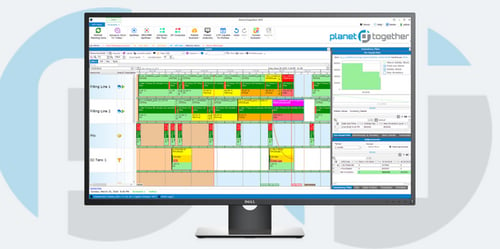Technology Implementation for Production Planners in Medical Manufacturing: Integrating PlanetTogether with ERP Systems
In the high-stakes world of medical manufacturing, where precision, compliance, and efficiency are non-negotiable, production planners must leverage advanced technology to streamline operations. As demand for personalized medical devices, strict regulatory compliance, and fluctuating supply chains challenge planners, integrating PlanetTogether APS (Advanced Planning and Scheduling) with leading enterprise systems like SAP, Oracle, Microsoft, Kinaxis, or Aveva is a imperative exigency.
This blog explores how technology implementation, particularly through APS integration, empowers production planners to optimize workflows, increase efficiency, and ensure seamless coordination across the supply chain.

The Need for Technology Implementation in Medical Manufacturing
Challenges Facing Production Planners
Production planning in medical manufacturing involves managing complex variables, including:
Regulatory Compliance – Strict adherence to FDA, ISO, and GMP requirements.
Demand Variability – Unpredictable fluctuations in patient needs and hospital demands.
Resource Optimization – Ensuring the right materials, equipment, and workforce are available.
Supply Chain Disruptions – Managing supplier reliability and material shortages.
Product Complexity – Custom and high-precision medical devices with intricate production processes.
With these challenges, traditional manual scheduling and disparate systems fall short, necessitating the integration of advanced technology for smarter planning and execution.

The Role of PlanetTogether APS in Medical Manufacturing
PlanetTogether APS is an intelligent scheduling tool that optimizes production planning by leveraging real-time data, predictive analytics, and automation. Key capabilities include:
Automated Scheduling – Reducing manual efforts in creating production schedules.
Scenario Planning – Simulating different scheduling scenarios for risk mitigation.
Real-Time Visibility – Providing a holistic view of production lines, capacity, and bottlenecks.
Material Synchronization – Ensuring just-in-time (JIT) material availability.
Regulatory Compliance – Supporting traceability and documentation requirements.
While APS alone is powerful, its true potential is realized when integrated with ERP, MES, and supply chain systems like SAP, Oracle, Microsoft, Kinaxis, or Aveva.

Integrating PlanetTogether with Enterprise Systems
1. Integration with SAP
SAP’s ERP solutions are widely used in medical manufacturing to manage procurement, inventory, and compliance. Integrating PlanetTogether with SAP allows for:
Seamless Data Flow – Automatic updates between APS and SAP’s inventory, procurement, and order management.
Capacity-Driven Planning – APS aligns production scheduling with SAP’s material requirement planning (MRP) to prevent shortages or overages.
Regulatory Audits – Enhanced tracking and reporting for compliance audits.
2. Integration with Oracle
Oracle ERP Cloud offers a robust infrastructure for managing end-to-end manufacturing operations. With PlanetTogether integration, production planners gain:
AI-Driven Decision-Making – Oracle’s AI-enhanced forecasting combined with APS’s scheduling intelligence for proactive planning.
Multi-Site Coordination – Efficient production balancing across global medical manufacturing plants.
Enhanced Cost Control – APS optimizes scheduling to reduce downtime and waste, feeding cost data back into Oracle.
3. Integration with Microsoft Dynamics 365
Microsoft Dynamics 365 provides real-time business intelligence and ERP functionalities. Integrating PlanetTogether with Dynamics 365 facilitates:
Cloud-Based Collaboration – Unified scheduling across multiple locations via Microsoft Azure.
IoT-Enabled Smart Manufacturing – IoT data from shop-floor sensors fed into APS for dynamic rescheduling.
Power BI-Driven Insights – Custom dashboards to monitor production KPIs and optimize performance.
4. Integration with Kinaxis
Kinaxis RapidResponse is a leading supply chain planning solution that provides real-time scenario analysis. Integrating with PlanetTogether helps production planners by:
Concurrent Planning – Aligning supply chain forecasting with actual production schedules.
Proactive Disruption Management – APS reschedules production in real time based on Kinaxis’s risk assessment models.
Supply-Demand Synchronization – Ensuring medical product availability aligns with demand fluctuations.
5. Integration with Aveva MES
Aveva’s Manufacturing Execution System (MES) enhances production control and operational efficiency. Integrating with PlanetTogether creates a powerful ecosystem where:
Shop-Floor Execution Meets Advanced Scheduling – APS-generated schedules are directly executed via Aveva MES.
Quality Control Automation – APS scheduling adjusts dynamically based on MES-driven quality checkpoints.
End-to-End Traceability – Ensuring compliance through synchronized production records.
Key Benefits of Technology Implementation
1. Optimized Production Efficiency
By integrating APS with enterprise solutions, medical manufacturers can eliminate scheduling inefficiencies, reduce idle time, and maximize output.
2. Enhanced Supply Chain Resilience
A seamless connection between production planning and supply chain management ensures agility in responding to market and supplier fluctuations.
3. Regulatory Compliance & Audit Readiness
Automated data capture and real-time tracking facilitate compliance with strict medical manufacturing regulations.
4. Cost Reduction
Through better planning, optimized resource utilization, and reduced material waste, production costs are minimized.
5. Data-Driven Decision-Making
Real-time insights allow planners to make informed decisions, improving on-time delivery and minimizing disruptions.
Technology implementation, particularly the integration of PlanetTogether APS with SAP, Oracle, Microsoft, Kinaxis, or Aveva, is revolutionizing production planning in medical manufacturing. By streamlining scheduling, enhancing visibility, and aligning supply chain strategies, production planners can achieve greater efficiency, compliance, and cost savings. Investing in such integrations is not just about improving operations—it’s about ensuring that critical medical products reach patients safely and on time.
For production planners looking to stay ahead in the evolving landscape of medical manufacturing, embracing technology-driven scheduling solutions is the key to success. Are you ready to take your manufacturing operations to the next level? Contact us today to learn more about how PlanetTogether can help you achieve your goals and drive success in your industry.
Topics: Regulatory Compliance, Automated Scheduling, PlanetTogether Software, Integrating PlanetTogether, Dynamic Scenario Planning, Medical Manufacturing, Material Synchronization





















LEAVE A COMMENT